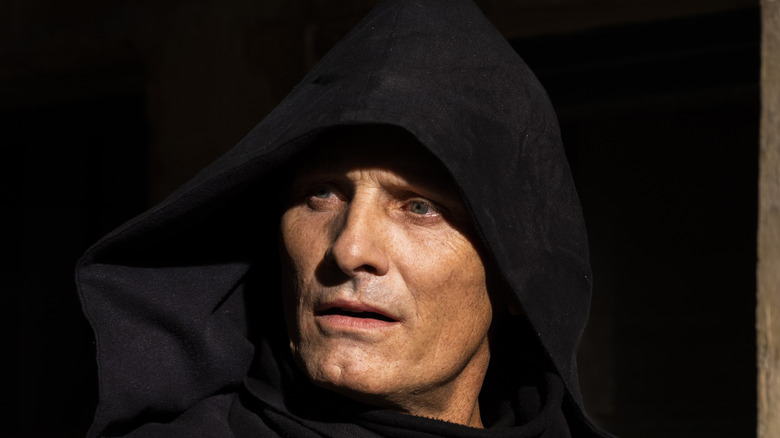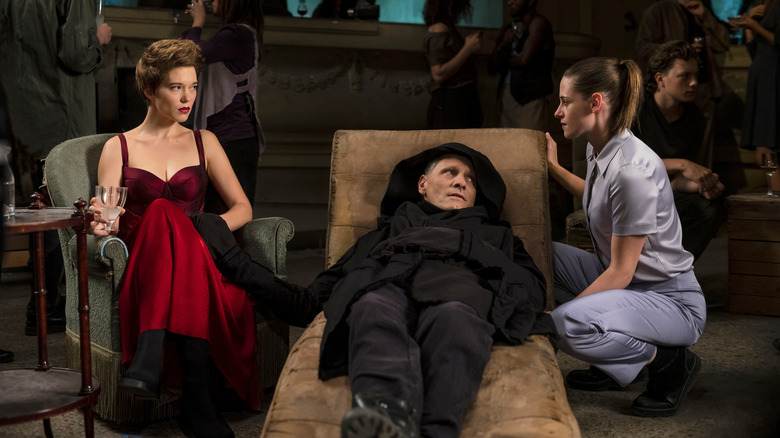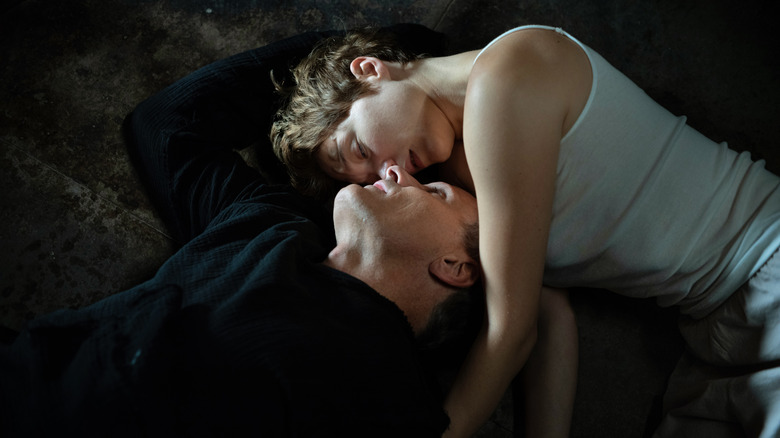Crimes Of The Future Review: Inner Beauty Pageants
- Beautiful, horrific visuals.
- Great performances from the core cast.
- A sense of otherworldly pacing that's pure Cronenberg.
- Some of the core ideas could have been explored a bit more in-depth.
It's been more than 20 years since David Cronenberg last returned to the realm of outright horror filmmaking. Films he's made in that two-decade drought, including "Eastern Promises" and "A History of Violence," certainly contain their share of horrific elements, but the imprint Cronenberg left so indelibly on the genre in the 1970s, 1980s, and 1990s was missing from the 2000s and the 2010s.
Still, longtime fans of the body horror master held out hope that he had something left to say in the realm on which he built his name, some grand statement that would one day be unleashed. We've finally gotten it with "Crimes of the Future," a sci-fi body horror descent into darkness that feels firmly rooted in Cronenberg's entire cinematic history as well as the concerns the filmmaker has carried into his 21st century work. Rich with unforgettable imagery and driven by a phenomenal cast who are all supremely game for Cronenberg's unflinching style, it's a film that feels not just like a return to form, but the culmination of 20 years of waiting for the right time to make a new horror film.
Surgery is the new sex
In a crumbling future in which pain receptors have dulled and infections virtually vanished, Saul (Viggo Mortensen) and his partner Caprice (Lea Seydoux) make their living on a growing performance art scene involving body modification and public surgery. Saul's specialty is mining his body for organs it produces with no apparent function, cultivating them until Caprice can publicly cut them out in front of an audience. For Saul, it's a vital statement about the changing state of humanity itself, an effort to control some genetic rebellious streak in his own body.
But for other people in this dark future, it's something else entirely. Thanks to run-ins with members of the newly formed Human Organ Registry, including the meek but fascinated Timlin (Kristen Stewart), and an encounter with a grieving father (Scott Speedman) with evolutionary concerns of his own, Saul starts to realize he's part of something bigger, something beyond performance.
It's probably no accident that Cronenberg chose now to make a body horror film in which a core concept is people opening themselves up to the world for the sake of performance. In an age of social media, confessional YouTube, and celebrities making brands out of their own personal struggles, it's both thrilling and compelling to watch one of our finest genre auteurs craft a world in which specialized wellness products exist specifically for Saul's kind of lifestyle, and in which a person can become a celebrity simply by opening fissures in their faces or daring to cut their abdomens open in full public view. The thematic weight of it, and the parallels to things like fandom, parasocial relationships, and the internet's notion that everyone is meant to be a kind of open book, is apparent from the opening scenes.
But Cronenberg has never been a filmmaker who uses his particular interests as a blunt instrument to draw one-to-one connections with the real world, and to underscore that he pulls "Crimes of the Future" further away from our reality than even the sci-fi grit of "The Fly" or the operatic heights of "Dead Ringers." The world is recognizable, yes, but Cronenberg's tweaks to the infrastructure we recognize create a grungy, noir-influenced parallel universe without smartphones, where the techno-organic has replaced the sleek minimalism of our devices, perhaps because this world used them all up until they were garbage. There's a sickly quality to the imagery, full of yellowed light and drapey clothing. Saul in particular looks almost skeletal beneath the flowing black tunic he's always sporting, creating a portrait of a man wasting away in a world that might not have use for him much longer. It's within this aesthetic that Cronenberg and his characters go beyond the theatrical and into something deeper and darker.
Inner beauty
The less said about where "Crimes of the Future" is actually headed with its exploration of surgery as a means of expression, confession, and even erotic satisfaction, the better, because going in blind will enhance the almost dreamlike pacing that drives the film. What is worth saying, though, is that Cronenberg's script is particularly eager to examine what a movement like this, and the changes in human biology that come along with it, does to the greater public consciousness. As with any great social change, division is bound to break out, factions are bound to form, and individuals will struggle within themselves as they search for meaning and connection in relation to the wider world.
It's there that the film is most interesting, particularly in light of the performances. Mortensen plays Saul as a man constantly in a quiet war with his own body, groaning and coughing as he moves and speaks, exploring the limits of his own physicality while also resisting the labels the wider world would like to place on him. Seydoux acts as a great foil to this energy, sleek and sensual and less cynical about the world, the light to Mortensen's shadow both visually and narratively. Then there's Stewart, who absolutely tears up the screen with nervous energy during her scenes. She deserves to become a Cronenberg regular, because there's clearly so much more she'd be interested in saying within his aesthetic.
Like every Cronenberg film, "Crimes of the Future" feels destined to divide audiences, with some repelled by its subject matter alone and others kept at a distance by its singular sense of pacing and tone. But for those of us who've always clicked with the Cronenberg aesthetic, it feels like a stunning return to horror brilliance for one of the genre's great innovators, and one of the must-see genre films of the year.
"Crimes of the Future" is in theaters June 3.


